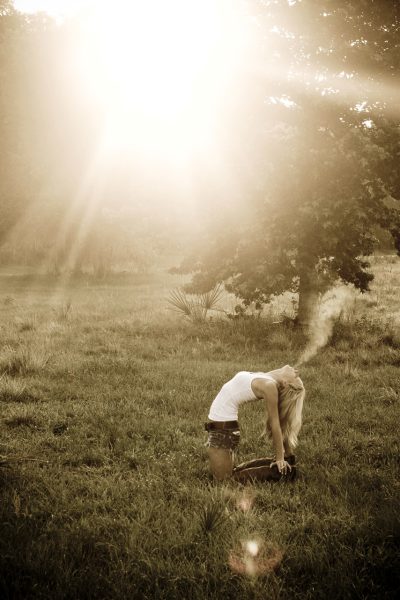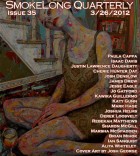I know these people. Do you? In general terms, who is Dad? Who is Mindy? Where did you encounter such characters?
The expected answer might be to say that all characters are based off people we know, blah blah, so I won’t say that. The dad is, in a way, my father, with me as the writer drawing from him what I know of fatherhood and one interpretation of masculinity. But, then, it’s not him. I don’t use as much of the “real world” as I tend to think many other writers do. My friend Brian is not going to read “Blood” and say, “Hey, that kid is me.” It’s the same with Mindy. She’s partly an ex-girlfriend, partly me in a way — which I think is crucial to how many characters are created, I think: some Freudian-subconcious-dream creation given voice on the page.
Did you ever get the peg advice? When?
I think I was the one giving myself that advice throughout high school. It became a part of the story mainly in response to the whole idea of nature I was toying with, which comes up again later in the story with Mindy. In a way, in that scene, I am that kid, or was him.
What is the appeal of a crack-the-whip story like this, where one thing jerks the reader into another? It’s all linked, but sort of violently.
I think the appeal of this type of thing, for me, is the action inherent in it. Every scene, moment, in this story requires some definitive action, something more than the navel-gazing trope of many short stories (some of mine included). I’ll tell you, I just watched City of God as I was writing this story. That’s a different world — Brazil in the inner city — but choices, actions, are explosive things. That’s what I wanted with this story.
It sounds like movies are a source of inspiration for you. Can you offer some other insight into where your stories come from?
Blood Meridian is always at the back of my mind, even if I’m not writing anything like it. Shall I throw out a couple “hip” references? OK. The Wire and Breaking Bad and Deadwood. All Paul Thomas Anderson’s work. Lake Superior, for sure. Alejandro Iñárritu, the Coen brothers. Stories, for me, come from some different places. Sometimes, it’s an image in a movie or song. Many times, I read an interesting piece of science news or animal biology and a story, somehow, comes out of that. I scour newspapers like a madperson and just steal things. (Austin Hummell, a poetry professor up here, told us that, as artists, we have to steal from anywhere we can.) I read this article in Scientific American, I think, about the possibility of an evil, oppositional-to-our-sun sun somewhere out in the universe that I’ve been waiting to use for a while.
The journal is called SmokeLong, of course. What are your vices? And do you have any writing vices?
Red meat. I’m a — thorough — carnivore. I’m prone to lit snobbery. Is that a vice? Ha. Pale ales. Bad joke-telling. Writing vices? I always have to have a short story collection I admire with me when writing short fiction or an essay collection when I’m writing essays. I constantly go back and forth between my words and the sage words I’m trying to draw inspiration from. My friend, Richard, has asked me a couple times, baffled (it seemed): “Why do you do that?” Folk music in drafting, punk rock in revision. I prefer not to wear shoes when I write.
What’s the best writing advice you’ve ever received? What’s the worst?
Tough question. Matthew Frank said, look, when you’re a writer, everything else is secondary to writing. (He excluded family, health, that stuff, of course). David Means (I emailed him when I first started writing and gushed at him, looking for advice) said to read everything I could. My dad, not referring to writing, said often, “You can always do better,” and I think that’s always there. The difference between “further” and “farther.” Ha. Worst? This might not be advice, per se, as it is in books and I’ve heard it at a reading, but I can’t buy the idea of getting into a writing trance, of finding your “dreamspace” and writing from that. This is Robert Olen Butler’s big thing, of course. I admire his work, but I just can’t get behind that. I heard him respond once, when asked where his ideas come from, that anyone who has “ideas” for stories will never be a great writer, that they must enter that white-hot place and just write. It’s not bad advice if it works for you, but it doesn’t work for me.



 The core workshop of SmokeLong Fitness is all in writing, so you can take part from anywhere at anytime. We are excited about creating a supportive, consistent and structured environment for flash writers to work on their craft in a community. We are thrilled and proud to say that our workshop participants have won, placed, or been listed in every major flash competition. Community works.
The core workshop of SmokeLong Fitness is all in writing, so you can take part from anywhere at anytime. We are excited about creating a supportive, consistent and structured environment for flash writers to work on their craft in a community. We are thrilled and proud to say that our workshop participants have won, placed, or been listed in every major flash competition. Community works.